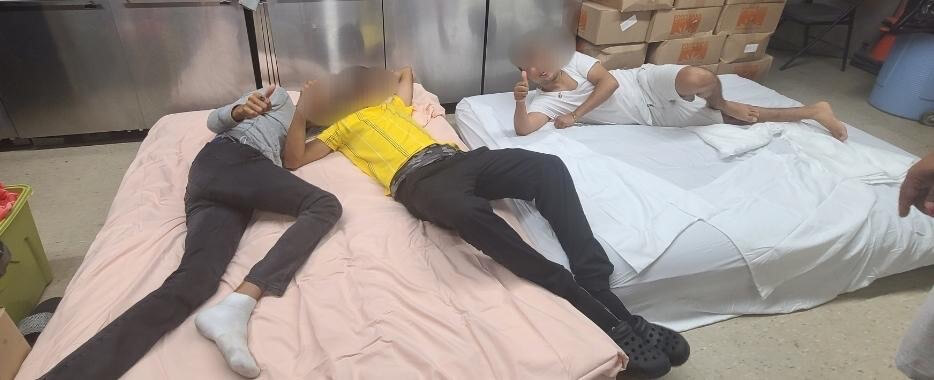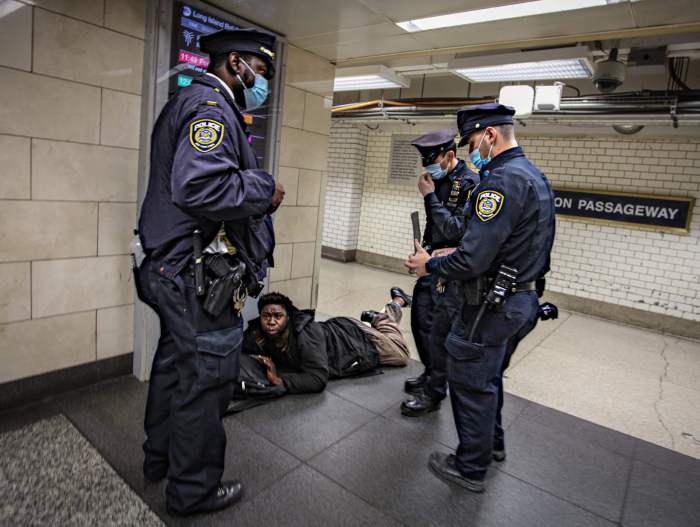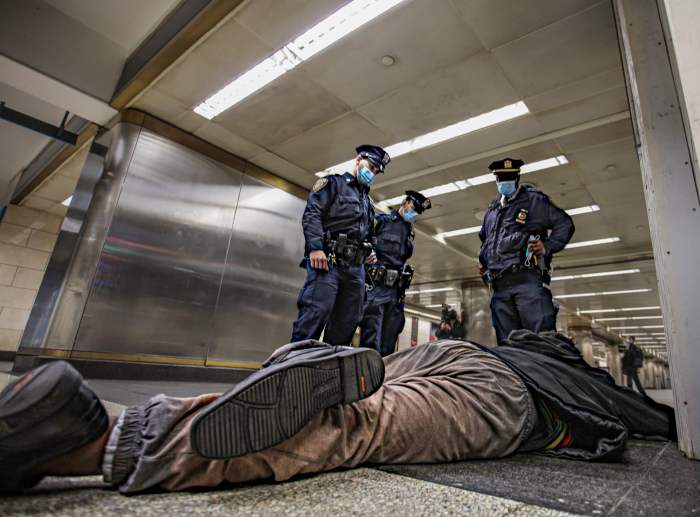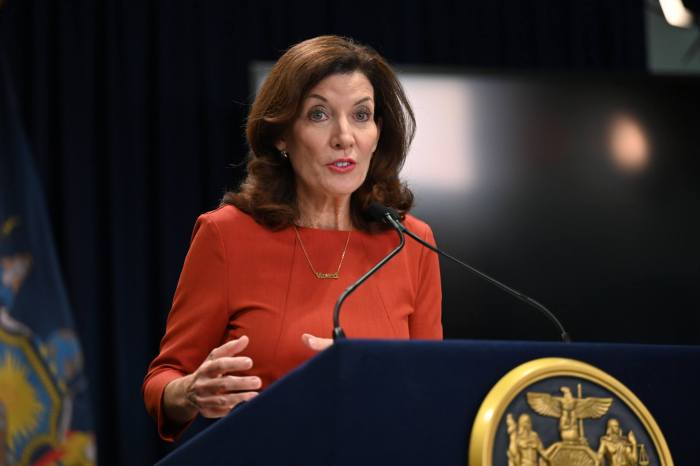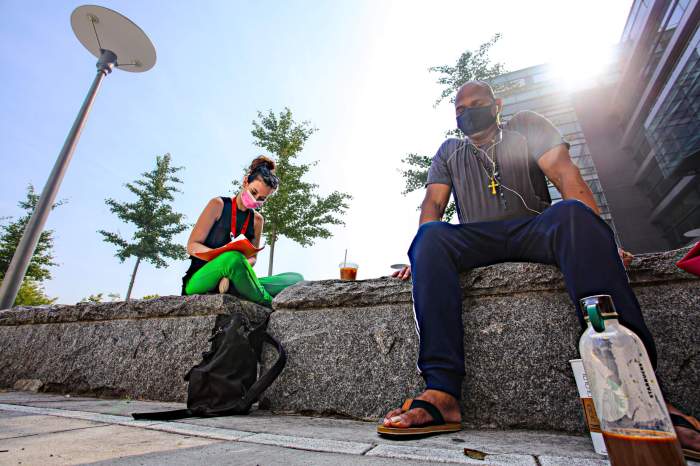Newly-arrived migrants from the Texas border recently found themselves turned away at a New York City men’s shelter after it reportedly reached capacity, leaving volunteers to open the doors to their own homes.
Nine migrants found themselves dazed and confused, wandering Port Authority on Aug. 31 when they arrived with no notice to volunteer organizations or city officials. It was only by chance that a volunteer, who was aiding African migrants to catch a bus to another location, that they were spotted. Already over encumbered with work, the volunteer contacted Lilah Mejia, a fellow greeter who has been working for over a month with others to assist in the sporadic arrivals.
In addition to aiding migrants arriving from Port Authority, Mejia works at a center to distribute food and clothing in the Lower East Side. She welcomed the nine men to a distribution site and provided them a place to shower, change clothes, and eat after their cumbersome journey.
“We fed them, bought them sandwiches, and then took them to the shelter,” Mejia told amNewYork Metro.
When they arrived at the HRA Men’s Shelter at 400 East 30th St., Mejia and her fellow volunteers were not permitted inside of the facility — as per protocol — and instead were told the men would be processed within a few hours. However, Mejia says that about two to three hours later she received a call from the migrants stating that they were denied spots due to the facility being at capacity.
“They called saying that they were kicked out because they had no beds, and they [the migrants] didn’t really understand what was going on. They didn’t let us in with them and we could have at least figured something out. There are also more busses coming at night, so we were trying to figure out what are we going to do, and I called so many people, but no one helped,” Mejia said.
The city did not provide a referral location, so Mejia returned to the shelter to pick up the men and attempted to find a solution.
She shared her irritation regarding city agencies who’ve been a part of the arrival process, however, Mejia contends that the legwork and effort has mostly fallen on volunteers to the point that organizations have asked volunteers if they feel comfortable sharing a room in their homes for migrants if the city cannot place them in a shelter—a request Mejia thinks is one step too far after the mayor’s office has pledged more than $6 million to aid.
Mejia found a way to provide a place to sleep for the nine migrants, purchasing air mattresses, feeding them, and showing them around the city. She understands that the influx of migrants arriving in the Big Apple has over encumbered the city and shelters, but as overwhelming as it may be it should be incumbent upon the city to find solutions and not leaving those already donating their time to shoulder the burden. It is empathy Mejia says that has pushed volunteers beyond their limits to provide help.
“Do you have space to house these f**king people? No, then I said hang up because there is no time for logistics. Why are we going to talk to people if they are not going to do anything for us? We picked them up and were given money from TLC to purchase air mattresses from Target. So that’s what we did,” Mejia said, frustrated about the continued obstacles and lack of aid from the city.
Mejia even shared that she reached out to Council Member Carlina Rivera’s office, like the other agencies their response was simply, “We’ll talk to DHS.”
“I’m so tired of this. ‘We’ll talk to DHS, we’ll talk to DHS.’ And nothing is being done,” Mejia said.
In August, when city agencies learned of the dispersal of migrants to sanctuary states at the hand of Texas Governor Greg Abbott, there have been over 6,000 arrivals, many of whom enter at Port Authority or via Mega Bus. During this time, volunteer groups banded together to greet the migrants, provide food, clothing, and aid during their point of entry with the Mayor’s Office of Immigrant Affairs (MOIA) overseeing the process.
Mejia was appalled when she first learned about Abbott dispersing humans like cattle to sanctuary cities to spite President Joe Biden’s decision to open the border. As not just a Latina, but as a human being, Mejia felt a kinship with these individuals who are simply attempting to seek asylum from countries rife with violence. Even with children, working, and attending college courses, she made sure to join in the aid.
For over a month Lilah Mejia has volunteered day and night with numerous others in aiding migrants traveling from Texas, and like many others donating their time to provide aid, they’ve noted difficulty in coordination and effort on the city’s part. But she continued in her mission as she felt a deep heartache listening to the stories of families separated and the gruesome journey from Latin America to the United States.
She saw people who were tired, afraid, but also hopeful that they have reached their destination to safety—only to be turned away.
One of the individuals in Mejia’s group had a male lover, who he was separated from at the shelter. When she arrived to retrieve the man, more men were outside of the shelter stating that they too have been turned away.
“I couldn’t take them in too. I felt bad. They just gave me this look of fear, and I couldn’t do anything. They had to sleep outside of the shelter until the next day hoping they will get a bed,” Mejia said.
For those that have made it into the shelter, some of have shared with Mejia claims that they are being scammed by city workers who are charging them money to help find work.
amNewYork Metro reached out to the Mayor’s office and Council Member Rivera’s office for comment and is awaiting a response.



